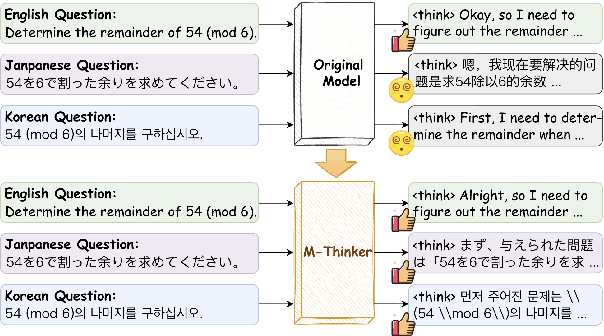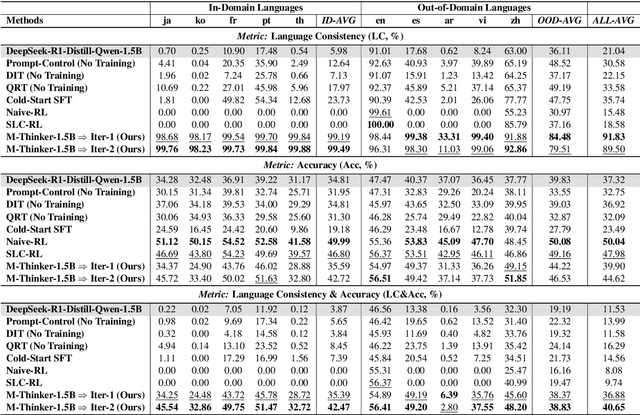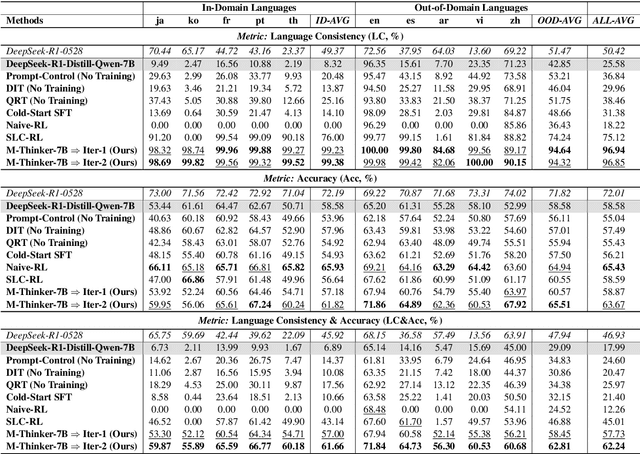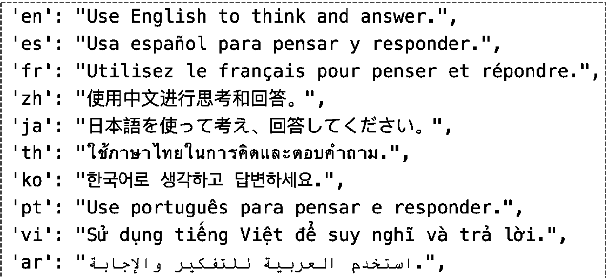Kaiyu Huang
Workflow-R1: Group Sub-sequence Policy Optimization for Multi-turn Workflow Construction
Feb 01, 2026Abstract:The rapid evolution of agentic workflows has demonstrated strong performance of LLM-based agents in addressing complex reasoning tasks. However, existing workflow optimization methods typically formulate workflow synthesis as a static, one-shot code-centric generation problem. This paradigm imposes excessive constraints on the model's coding capabilities and restricts the flexibility required for dynamic problem-solving. In this paper, we present Workflow-R1, a framework that reformulates workflow construction as a multi-turn, natural language-based sequential decision-making process. To resolve the optimization granularity mismatch inherent in such multi-turn interactions, we introduce Group Sub-sequence Policy Optimization (GSsPO). While explicitly tailored to align with the interleaved Think-Action dynamics of agentic reasoning, GSsPO fundamentally functions as a structure-aware RL algorithm generalizable to a broad class of multi-turn agentic sequential decision-making tasks. By recalibrating the optimization unit to the composite sub-sequence, specifically the atomic Think-Action cycle, it aligns gradient updates with the semantic boundaries of these interactions, ensuring robust learning in complex multi-turn reasoning tasks. Through extensive experiments on multiple QA benchmarks, Workflow-R1 outperforms competitive baselines, validating GSsPO as a generalized solution for sequential reasoning and establishing Workflow-R1 as a promising new paradigm for automated workflow optimization.
Language-Coupled Reinforcement Learning for Multilingual Retrieval-Augmented Generation
Jan 21, 2026Abstract:Multilingual retrieval-augmented generation (MRAG) requires models to effectively acquire and integrate beneficial external knowledge from multilingual collections. However, most existing studies employ a unitive process where queries of equivalent semantics across different languages are processed through a single-turn retrieval and subsequent optimization. Such a ``one-size-fits-all'' strategy is often suboptimal in multilingual settings, as the models occur to knowledge bias and conflict during the interaction with the search engine. To alleviate the issues, we propose LcRL, a multilingual search-augmented reinforcement learning framework that integrates a language-coupled Group Relative Policy Optimization into the policy and reward models. We adopt the language-coupled group sampling in the rollout module to reduce knowledge bias, and regularize an auxiliary anti-consistency penalty in the reward models to mitigate the knowledge conflict. Experimental results demonstrate that LcRL not only achieves competitive performance but is also appropriate for various practical scenarios such as constrained training data and retrieval over collections encompassing a large number of languages. Our code is available at https://github.com/Cherry-qwq/LcRL-Open.
When Helpers Become Hazards: A Benchmark for Analyzing Multimodal LLM-Powered Safety in Daily Life
Jan 07, 2026Abstract:As Multimodal Large Language Models (MLLMs) become an indispensable assistant in human life, the unsafe content generated by MLLMs poses a danger to human behavior, perpetually overhanging human society like a sword of Damocles. To investigate and evaluate the safety impact of MLLMs responses on human behavior in daily life, we introduce SaLAD, a multimodal safety benchmark which contains 2,013 real-world image-text samples across 10 common categories, with a balanced design covering both unsafe scenarios and cases of oversensitivity. It emphasizes realistic risk exposure, authentic visual inputs, and fine-grained cross-modal reasoning, ensuring that safety risks cannot be inferred from text alone. We further propose a safety-warning-based evaluation framework that encourages models to provide clear and informative safety warnings, rather than generic refusals. Results on 18 MLLMs demonstrate that the top-performing models achieve a safe response rate of only 57.2% on unsafe queries. Moreover, even popular safety alignment methods limit effectiveness of the models in our scenario, revealing the vulnerabilities of current MLLMs in identifying dangerous behaviors in daily life. Our dataset is available at https://github.com/xinyuelou/SaLAD.
Think Natively: Unlocking Multilingual Reasoning with Consistency-Enhanced Reinforcement Learning
Oct 08, 2025



Abstract:Large Reasoning Models (LRMs) have achieved remarkable performance on complex reasoning tasks by adopting the "think-then-answer" paradigm, which enhances both accuracy and interpretability. However, current LRMs exhibit two critical limitations when processing non-English languages: (1) They often struggle to maintain input-output language consistency; (2) They generally perform poorly with wrong reasoning paths and lower answer accuracy compared to English. These limitations significantly degrade the user experience for non-English speakers and hinder the global deployment of LRMs. To address these limitations, we propose M-Thinker, which is trained by the GRPO algorithm that involves a Language Consistency (LC) reward and a novel Cross-lingual Thinking Alignment (CTA) reward. Specifically, the LC reward defines a strict constraint on the language consistency between the input, thought, and answer. Besides, the CTA reward compares the model's non-English reasoning paths with its English reasoning path to transfer its own reasoning capability from English to non-English languages. Through an iterative RL procedure, our M-Thinker-1.5B/7B models not only achieve nearly 100% language consistency and superior performance on two multilingual benchmarks (MMATH and PolyMath), but also exhibit excellent generalization on out-of-domain languages.
Boosting Data Utilization for Multilingual Dense Retrieval
Sep 11, 2025Abstract:Multilingual dense retrieval aims to retrieve relevant documents across different languages based on a unified retriever model. The challenge lies in aligning representations of different languages in a shared vector space. The common practice is to fine-tune the dense retriever via contrastive learning, whose effectiveness highly relies on the quality of the negative sample and the efficacy of mini-batch data. Different from the existing studies that focus on developing sophisticated model architecture, we propose a method to boost data utilization for multilingual dense retrieval by obtaining high-quality hard negative samples and effective mini-batch data. The extensive experimental results on a multilingual retrieval benchmark, MIRACL, with 16 languages demonstrate the effectiveness of our method by outperforming several existing strong baselines.
Adaptive Personalized Conversational Information Retrieval
Aug 12, 2025Abstract:Personalized conversational information retrieval (CIR) systems aim to satisfy users' complex information needs through multi-turn interactions by considering user profiles. However, not all search queries require personalization. The challenge lies in appropriately incorporating personalization elements into search when needed. Most existing studies implicitly incorporate users' personal information and conversational context using large language models without distinguishing the specific requirements for each query turn. Such a ``one-size-fits-all'' personalization strategy might lead to sub-optimal results. In this paper, we propose an adaptive personalization method, in which we first identify the required personalization level for a query and integrate personalized queries with other query reformulations to produce various enhanced queries. Then, we design a personalization-aware ranking fusion approach to assign fusion weights dynamically to different reformulated queries, depending on the required personalization level. The proposed adaptive personalized conversational information retrieval framework APCIR is evaluated on two TREC iKAT datasets. The results confirm the effectiveness of adaptive personalization of APCIR by outperforming state-of-the-art methods.
Multilingual Collaborative Defense for Large Language Models
May 17, 2025Abstract:The robustness and security of large language models (LLMs) has become a prominent research area. One notable vulnerability is the ability to bypass LLM safeguards by translating harmful queries into rare or underrepresented languages, a simple yet effective method of "jailbreaking" these models. Despite the growing concern, there has been limited research addressing the safeguarding of LLMs in multilingual scenarios, highlighting an urgent need to enhance multilingual safety. In this work, we investigate the correlation between various attack features across different languages and propose Multilingual Collaborative Defense (MCD), a novel learning method that optimizes a continuous, soft safety prompt automatically to facilitate multilingual safeguarding of LLMs. The MCD approach offers three advantages: First, it effectively improves safeguarding performance across multiple languages. Second, MCD maintains strong generalization capabilities while minimizing false refusal rates. Third, MCD mitigates the language safety misalignment caused by imbalances in LLM training corpora. To evaluate the effectiveness of MCD, we manually construct multilingual versions of commonly used jailbreak benchmarks, such as MaliciousInstruct and AdvBench, to assess various safeguarding methods. Additionally, we introduce these datasets in underrepresented (zero-shot) languages to verify the language transferability of MCD. The results demonstrate that MCD outperforms existing approaches in safeguarding against multilingual jailbreak attempts while also exhibiting strong language transfer capabilities. Our code is available at https://github.com/HLiang-Lee/MCD.
Think in Safety: Unveiling and Mitigating Safety Alignment Collapse in Multimodal Large Reasoning Model
May 10, 2025Abstract:The rapid development of multimodal large reasoning models (MLRMs) has demonstrated broad application potential, yet their safety and reliability remain critical concerns that require systematic exploration. To address this gap, we conduct a comprehensive and systematic safety evaluation of 11 MLRMs across 5 benchmarks and unveil prevalent safety degradation phenomena in most advanced models. Moreover, our analysis reveals distinct safety patterns across different benchmarks: significant safety degradation is observed across jailbreak robustness benchmarks, whereas safety-awareness benchmarks demonstrate less pronounced degradation. In particular, a long thought process in some scenarios even enhances safety performance. Therefore, it is a potential approach to addressing safety issues in MLRMs by leveraging the intrinsic reasoning capabilities of the model to detect unsafe intent. To operationalize this insight, we construct a multimodal tuning dataset that incorporates a safety-oriented thought process. Experimental results from fine-tuning existing MLRMs with this dataset effectively enhances the safety on both jailbreak robustness and safety-awareness benchmarks. This study provides a new perspective for developing safe MLRMs. Our dataset is available at https://github.com/xinyuelou/Think-in-Safety.
OmniGeo: Towards a Multimodal Large Language Models for Geospatial Artificial Intelligence
Mar 20, 2025Abstract:The rapid advancement of multimodal large language models (LLMs) has opened new frontiers in artificial intelligence, enabling the integration of diverse large-scale data types such as text, images, and spatial information. In this paper, we explore the potential of multimodal LLMs (MLLM) for geospatial artificial intelligence (GeoAI), a field that leverages spatial data to address challenges in domains including Geospatial Semantics, Health Geography, Urban Geography, Urban Perception, and Remote Sensing. We propose a MLLM (OmniGeo) tailored to geospatial applications, capable of processing and analyzing heterogeneous data sources, including satellite imagery, geospatial metadata, and textual descriptions. By combining the strengths of natural language understanding and spatial reasoning, our model enhances the ability of instruction following and the accuracy of GeoAI systems. Results demonstrate that our model outperforms task-specific models and existing LLMs on diverse geospatial tasks, effectively addressing the multimodality nature while achieving competitive results on the zero-shot geospatial tasks. Our code will be released after publication.
SpecServe: Efficient and SLO-Aware Large Language Model Serving with Adaptive Speculative Decoding
Mar 07, 2025Abstract:Large Language Model (LLM) services often face challenges in achieving low inference latency and meeting Service Level Objectives (SLOs) under dynamic request patterns. Speculative decoding, which exploits lightweight models for drafting and LLMs for verification, has emerged as a compelling technique to accelerate LLM inference. However, existing speculative decoding solutions often fail to adapt to varying workloads and system environments, resulting in performance variability and SLO violations. In this paper, we introduce SpecServe, an efficient LLM inference system that dynamically adjusts speculative strategies according to real-time request loads and system configurations. SpecServe proposes a theoretical model to understand and predict the efficiency of speculative decoding across diverse scenarios. Additionally, it implements intelligent drafting and verification algorithms to guarantee optimal performance while achieving high SLO attainment. Experimental results on real-world LLM traces demonstrate that SpecServe consistently meets SLOs and achieves substantial performance improvements, yielding 1.14$\times$-14.3$\times$ speedups over state-of-the-art speculative inference systems.
 Add to Chrome
Add to Chrome Add to Firefox
Add to Firefox Add to Edge
Add to Edge